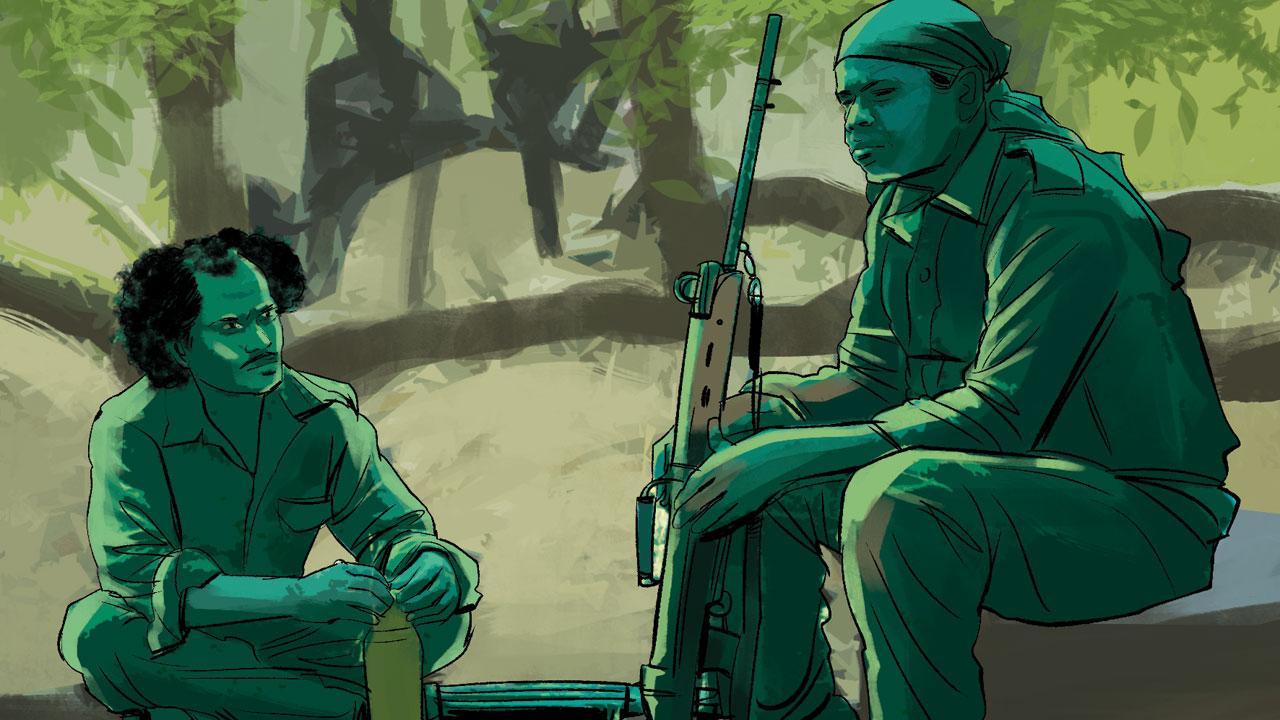But Ghaath is an original voice: the Nagpur-based Ninawe is from the Halba-Koshti indigenous community himself, and so offers us an ‘insider’s’ viewpoint on the community

Illustration/Uday Mohite
![]() Chhatrapal Ninawe’s Ghaath (Ambush, Marathi) got a warm reception at its world premiere at the Berlin International Film Festival last week. The film, that played in the Panorama section, had a dramatic history. After it was selected by the Berlinale in 2021, and its main producer withdrew the film after the selection, Michael Stütz, Head of Panorama, in an extraordinary gesture of faith I have never seen in 25 years of working with the Berlin Film Festival, again invited the film to the 2023 edition, even before the festival opened for submissions.
Chhatrapal Ninawe’s Ghaath (Ambush, Marathi) got a warm reception at its world premiere at the Berlin International Film Festival last week. The film, that played in the Panorama section, had a dramatic history. After it was selected by the Berlinale in 2021, and its main producer withdrew the film after the selection, Michael Stütz, Head of Panorama, in an extraordinary gesture of faith I have never seen in 25 years of working with the Berlin Film Festival, again invited the film to the 2023 edition, even before the festival opened for submissions.
Ghaath is set among Adivasi/indigenous/tribal communities living in the forests of Maharashtra, who are trapped between Maoist rebels and the state. Indian cinema, especially the parallel cinema movement that peaked in the 1970s and ’80s, has a long history of films dealing with indigenous people, scheduled castes and tribes. These include Satyajit Ray’s Sadgati, Govind Nihalani’s Aakrosh and Hazaar Chaurasi ki Maa, Mrinal Sen’s Mrigayaa, and his trilogy Interview, Calcutta 71 and Padatik (Bengali) that comment on the Naxalite movement; Goutam Ghose’s Paar and Buddhadeb Dasgupta’s Charachar, to more recent films like Lijo Jose Pellissery’s Churuli (Malayalam). But Ghaath is an original voice: the Nagpur-based Ninawe is from the Halba-Koshti indigenous community himself, and so offers us an ‘insider’s’ viewpoint on the community.
The film explores how the decades-long civil war between the Maoist rebels and the state, leave the indigenous people threatened by both sides, living with the ever-present threat of violence, exploitation or death. The film plays on ambiguities, as the situation makes it challenging to know whom to trust, whether strangers or those closest to you. Structured in three chapters, reflecting the jungle-jal-jameen theme, it explores the conflict from the viewpoints of three key protagonists—Phagun (Dhananjay Mandaokar), a tribal informer seeking to avenge his parents’ murder by the police; a melancholic, alcoholic police officer ACP Nagpure (Jitendra Joshi) keen to be transferred out; and Raghunath (Milind Shinde), a disgruntled guerrilla and Phagun’s brother. There is also a fascinating character, Perku (Janardan Kadam), an Adivasi, whose senses are heightened; who can smell the presence of humans and animals in the jungle, who eats roasted fish and lizards. Describing himself as the son of the river, he is a philosophical counterpoint, questioning what we describe as ‘civilisation.’
Also Read: When Columbus came to Parel before the cops did
Ninawe directs the film in a powerful, raw manner. Jitendra Joshi (Sacred Games, Godavari) is marvellous as a deeply melancholic, alcoholic police officer posted in the jungle. A loner—his family is in Pune—he befriends Perku in order to get information on the rebels. His work seems to swing between doing “encounters”—killing on suspicion, later framed as self-defence, and thoughts about arranging Maoist surrenders to earn a transfer out. Dhananjay Mandaokar, Milind Shinde, Janardan Kadam and Suruchi Adarkar as the tribal Kusari, are effective. Ninawe and Vikas Mudaki’s screenplay reflects on the constant and cyclical nature of violence. The two brothers could have had more depth to their characters. There are a number of killings, but the violence is never gratuitous or overly dramatised; though it would have helped if the motivations of some of the killings were clear. Women are barely present, but there are hints of a feminist sensibility, through Kusari and Nagpure’s wife. Cinematographer Udit Khurana shoots the film in a spare, lean manner, reflecting the lives and milieu of its protagonists, with superb sequences in the jungle. Editor Navnita Sen keeps it fairly taut. Music composer Madhur Padwal’s use of folk instruments and Manoj Goswami’s sound design are spare and effective. The producers include Shiladitya Bora and Manish Mundra. The women’s contribution, hearteningly includes Sanyukta Gupta (producer), Shilpi Agarwal (co-producer), Navnita Sen (editor), Neha Sawant (casting), Utpala Barve (costumes) and Serina Tixeira (make-up). As giant corporations including Adani and Vedanta take over large tribal areas in India, may we have many more indigenous voices speaking for themselves, and gaining what is now called “narrative sovereignty”.
Meenakshi Shedde is India and South Asia Delegate to the Berlin International Film Festival, National Award-winning critic, curator to festivals worldwide and journalist.
Reach her at meenakshi.shedde@mid-day.com
 Subscribe today by clicking the link and stay updated with the latest news!" Click here!
Subscribe today by clicking the link and stay updated with the latest news!" Click here!










